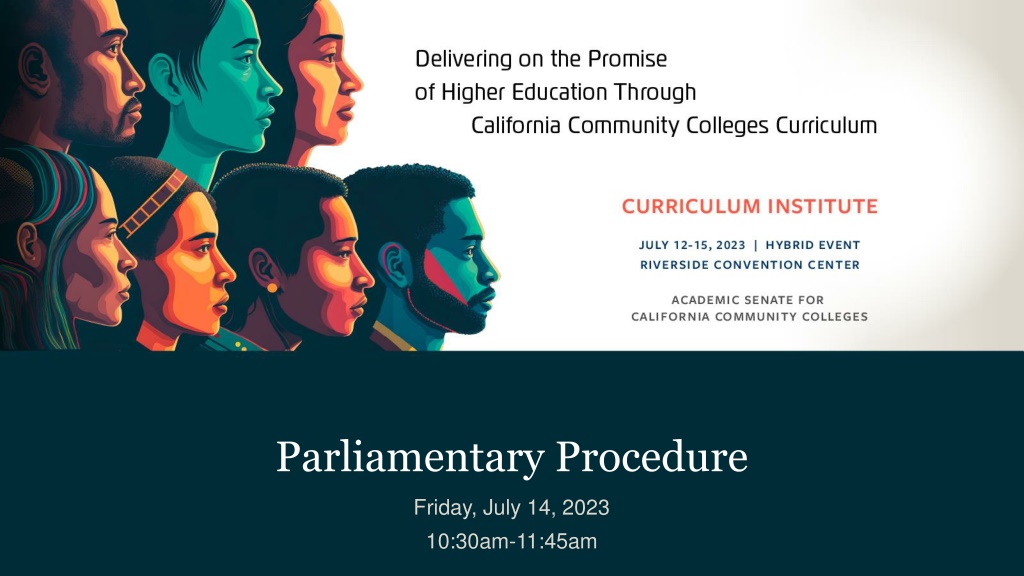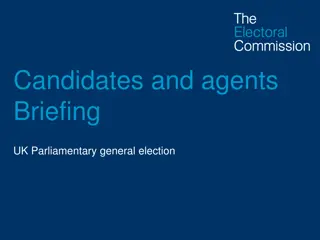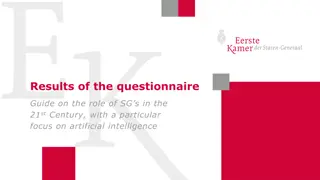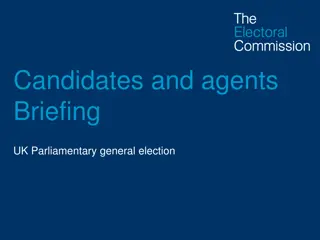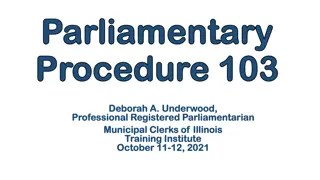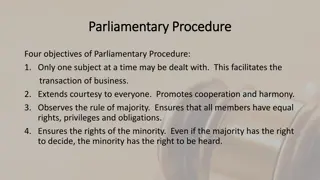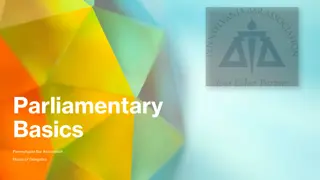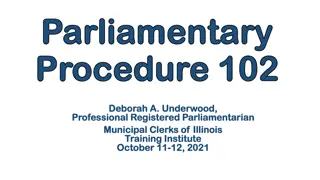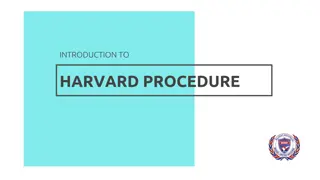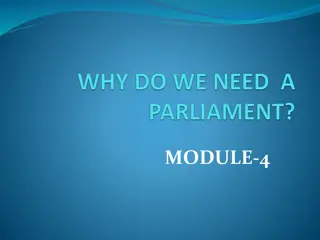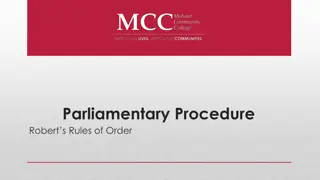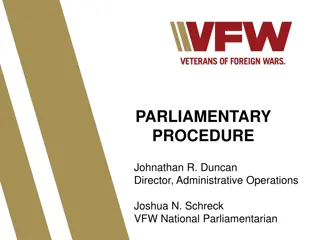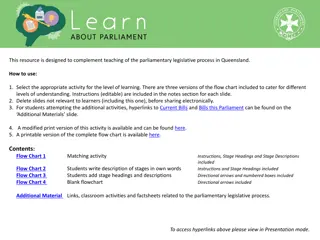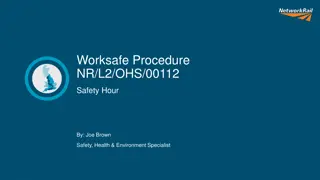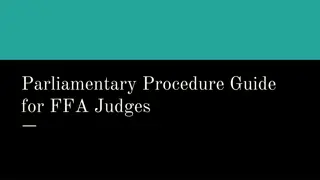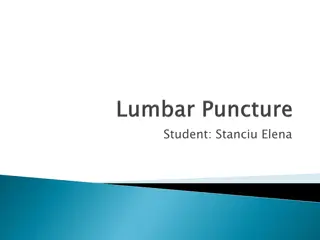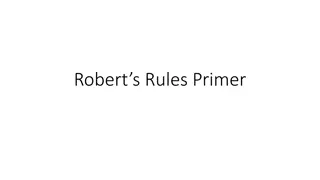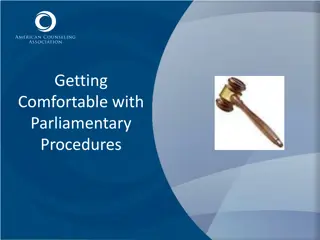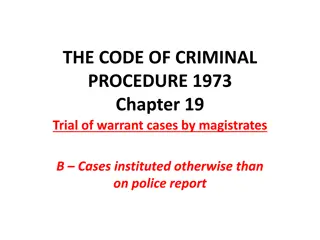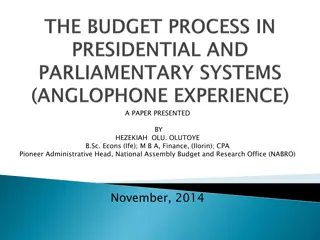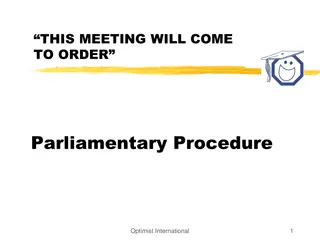Parliamentary Procedure
Learn about the role, principles, and importance of parliamentary procedure in running effective meetings. Explore the basics of Robert's Rules of Order, agenda building, the relationship between parliamentary procedure and the Brown Act, and tools for chairs to facilitate discussions and decision-making. Discover how parliamentary procedure ensures all voices are heard and decisions are reached efficiently and inclusively.
Download Presentation

Please find below an Image/Link to download the presentation.
The content on the website is provided AS IS for your information and personal use only. It may not be sold, licensed, or shared on other websites without obtaining consent from the author. Download presentation by click this link. If you encounter any issues during the download, it is possible that the publisher has removed the file from their server.
E N D
Presentation Transcript
Parliamentary Procedure Friday, July 14, 2023 10:30am-11:45am
Presenters Eric Narveson, Evergreen Valley College, ASCCC Curriculum Committee Erik Reese, Moorpark College, ASCCC Area C Representative 2
Session Description Parliamentary procedure provides guidelines for running effective meetings. For example, Robert s Rules of Order Newly Revised aims to facilitate an organization to work out satisfactory solutions to the greatest number of questions in the least amount of time, while still providing folks the opportunity to discuss and share diverse views. Join this interactive session to learn the basics of how to effectively run meetings and practice running and contributing to meetings of deliberative bodies. 3
Outline Role & principles of parliamentary procedure Basics of Robert s Rules of Order Newly Revised Relationship between parliamentary procedure and Brown Act Building an agenda Relationship between curriculum committee and academic senate Tools for chairs Resources, including alternatives to Robert s Rules 4
Role of Parliamentary Procedure Effective meeting management Arrive at the general will on the greatest number of questions in the minimum amount of time, while being inclusive Reach decisions regardless of whether there is total harmony or impassioned division of opinion 5
Principles of Parliamentary Procedure All voices are heard Ability for each member to provide input on topics All members have equal rights, privileges, and obligations Full and free discussion with a diversity of ideas Maintenance of order 6
Role of the Chair Introduces agenda items and provides factual context Recognizes speakers Keeps discussion centered on current item/motion Facilitates votes on motions and other items, and announces the results Ensures that all members understands exactly what is being voted on Remains impartial during the debate Maintains the integrity of the parliamentary process 7
Quorum Must have quorum to make decisions Majority of voting members (more than half) Must be maintained throughout meeting Note that your bylaws may define quorum differently 8
Basic Process for Motions Member obtains recognition of the chair Member makes a motion Motion must be seconded by another member Chair states the motion and opens debate Maker of motion may speak first in debate Debate ensues Chair puts the question, aka facilitates the vote Chair announces the results Note: Brown Act requires all votes be listed in the minutes 9
Rules of Engagement Collegiality and supporting students is the common goal Debate ideas, not personalities Keep debate focused on the current motion/item being considered All remarks are addressed to the chair 10
General Rules of Debate (partial) Members may only speak if recognized by chair All discussion must be relevant to motion/item Members may speak up to twice on a motion/item Each time, members may speak up to 10 minutes Members that have yet to speak in a motion/item have preference When possible, alternate between pro and con speakers 11
Request for Information, Parliamentary Inquiry, and Point of Order Request for Information Inquiry as to the facts affecting the business at hand Parliamentary Inquiry Request for the Chair s opinion on a matter of parliamentary procedure as it relates to the business at hand (not a ruling) Point of Order May interrupt the current speaker if timely Member calls attention to a violation of the rules of the assembly Must be raised promptly at the time the breach occurs 12
A Few Common Motions Motion Main motion Amend Wording I move to I move to amend the motion I move that [X] be referred to a committee I move to postpone I move the previous question Second? Debate? Yes Yes Amend? Yes Yes Vote Majority Majority Yes Yes Commit or Refer Yes Yes Yes Majority Postpone Previous question (end debate) Request for information Parliamentary inquiry Yes Yes Yes No Yes No Majority 2/3 I have a request for information I would like to make a parliamentary inquiry Point of order! No No No -- No No No -- Point of order No No No -- 13
Unanimous Consent Full process is, perhaps, a bit time-consuming Unanimous consent provides a streamlined process Chair asks if there is any objection to the desired action If there are no objections, the chair declares agreement on the desired action Useful for routine matters and those without opposition 14
Chairs Participation in Voting Chair ought to remain impartial Does not participate in debate or vote Exceptions: Chair s vote will change the results of the vote Vote is by ballot Changing the outcome examples for majority vote If tie vote, motion fails and chair may vote for motion so it passes If pro exceeds con by only one vote, chair may vote against causing motion to fail with a tie 15
Role of Parliamentarian Committees may or may not have formal parliamentarian positions Parliamentarian serves in an advisory role, helping the chair The parliamentarian does not have the final word Only the chair may rule on the final application of the rules 16
Relationship Between Parliamentary Procedure and the Brown Act Brown Act is law Parliamentary procedure are guidelines Examples of overlap: Consider items on agenda only Recording of votes Public comments May impose time constraints Chair (and other members) do not respond Types of voting: for example, roll call vote when teleconferencing 17
Professional Development Opportunities Committee retreat or first meeting of the academic year cover such topics as Charge/purpose of committee and place within participatory governance structures on your campus Roles and expectations of committee members Parliamentary procedure Brown Act 18
Relationship Between Curriculum and Academic Senate Will vary by college Does curriculum approved by the Curriculum Committee go directly to the board (or perhaps district curriculum committee)? Or does curriculum approved by the Curriculum Committee go to Academic Senate for final approval? 19
Building an Agenda: Sample Agenda Structure 1 Call to Order* Adoption of the Agenda* Public Comments* Approval of the Minutes Action Items Discussion/Information Items Reports (chairs, AO, etc.) Adjournment 20
Building an Agenda: Sample Agenda Structure 2 Call to Order* Adoption of the Agenda* Public Comments* Approval of the Minutes Unfinished Business New Business Reports Adjournment 21
Tools For Chairs Under Pressure You got this! Deep breaths Ensure members understand what is being considered No such thing as repeating the motion too much Alternating pro and con Twice is the max on a motion Time limits (default is each time one may speak for 10 minutes) 22
Alternatives to Roberts Rules of Order Consensus Decision-Making: A Virtual Learning Center Democratic Rules of Order (this has to be purchased) Simplified Rules of Order Atwood s Rules Comparison of Robert s Rules, Consensus Process and Dynamic Facilitation Martha s Rules of Order 23
Resources Robert s Rules of Order in Brief Robert s Rules for Dummies Questions: info@asccc.org Request a local senate visit or other visit 24
Practice Move to approve presented courses Move that coffee ought to be provided at all curriculum committee meetings Move to change curricular management system 25
